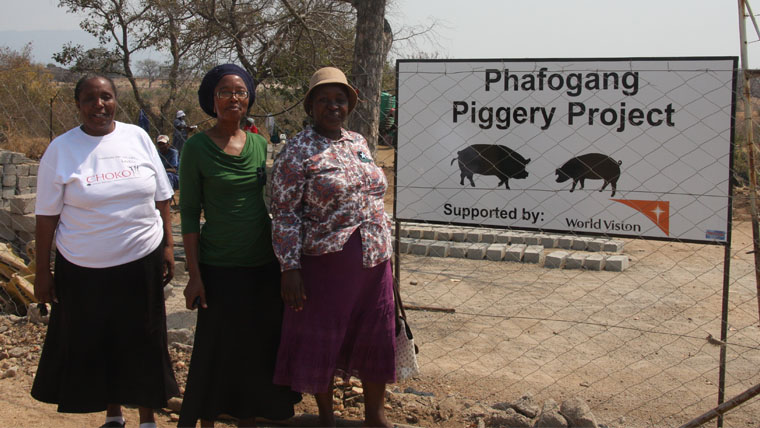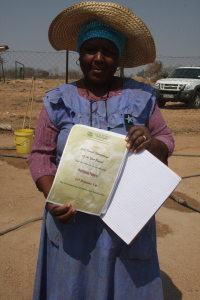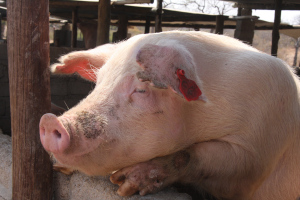Pigs and Poultry mean Progress in South Africa
In his latest blog from South Africa, child sponsor James Butler talks about some of the inspiring World Vision projects he’s visited and the amazing hope they are giving to the women involved.

We leave Dieketseng’s village and head to another one nearby. Unlike an English village, with houses all packed together, often round a village centre, villages here are large sprawling affairs, stretching for miles, with each property having a patch of land, and there often being gaps between houses. I am sure it is only chaotic to the untrained eye, but I can imagine a British town planner having kittens if they saw this.
We head off the main tarred road onto a side street, then this tar road peters out into a gravel track, then the gravel track peters out into a dirt trail, and we are grateful we hired an SUV and not the VW Polo back in Johannesburg! As the road deteriorates, so does the standard of housing. We know from Ledile that this part of the ADP is in the most need, and it shows.
On the very very edge of the village, beyond which lies bush not dissimilar to the vegetation we see in the wildlife parks, we see a very smart sign telling us we have arrived at the Phafogang Piggery Project, supported by World Vision.
We are excited to see this project, because the community group we help run, Choko, is due to support more of these projects in 2012/13, so we are keen to see how they work and what difference they make. We are welcomed by the ladies who run this women’s co-operative. We are immediately reminded of some advice we were given at our hotel (the amazing Rissington Inn in Hazyview) – that the standard salutation for black South Africans, when speaking English, is to say “How are you?” as you shake hands. The standard reply is “I am fine, how are you?” To which the first person replies “I am fine” – and this happens irrespective of whether anyone is fine or not! As we hear this for about the tenth time today, we realise how true it is!
The piggery project is essentially about 15 pig sties built in two continuous rows, with an alley down the centre. I raised pigs on a smallholding as child, and this surpasses what we had in Norfolk in the early 80s. Nearest to us, the pen is filled by two large sows, making quite a noise because it is near feeding time. Further down are suckling sows and very cute piglets.In total there are about 100 pigs we are told.
 The leader of the ladies shows us a certificate they have already won in a local competition for entrepreneurship. She is very proud, and deserves to be. Ledile explains to us how the project works. The ladies raise the pigs from one (very contented) male. After 8 months the pigs are large enough to be of interest to the local butcher, and the ladies can sell them.
The leader of the ladies shows us a certificate they have already won in a local competition for entrepreneurship. She is very proud, and deserves to be. Ledile explains to us how the project works. The ladies raise the pigs from one (very contented) male. After 8 months the pigs are large enough to be of interest to the local butcher, and the ladies can sell them.
World Vision has given these ladies support to build the pens, and purchase feed in that initial eight month cycle. Running a business myself back in England, I can see how there is a need for a lot of capital to start this project – building materials and the eight months of feed etc – before any income is created through meat sales. World Vision also help with the business and banking skills, and by getting the state vet and advisors to visit the project and help the ladies. Then Ledile explains that the pigs’ final journey to the abattoir happens in her pickup truck, and she is quick to establish that the ladies must clean the truck afterwards (and not on the outside!). With motor vehicles so scarce here, you can see the value of the ADP truck.
Now these ladies are established, and the income is starting to come in, they are making a profit and re-investing in new buildings to expand production. With professional advice from the Dept of Agriculture they are learning about disease control and improving productivity. With support from the ADP they are gaining business skills, and Ledile is doing her usual job of bringing in outside agencies where possible, and building the confidence and capacity of these ladies to run their own business.
The co-operative consists of ten women, plus 27 other staff who are paid on some sort of welfare-to-work scheme the government runs. So almost 40 people are deriving an income from the project. And with employment so scarce, this probably means over 100 people directly sustained day to day by this project alone. And, once they are over this initial start-up phase, the project is totally self-sustaining. It is a cliche I know, but this is a classic example of World Vision’s mantra of ‘a hand up, not a hand-out’.
 We have quite a tour of the piggery: each sty has ‘Room 5′ or ‘Room 6′ etc above it on the roof beam – the ladies clearly have a sense of humour. They also have a (justified) sense of pride. I think back to the Sugar Man the previous day, and the way one guy was treated by his employer, and I realise the value in these ladies creating their own employment. Not only does this keep the profits within the village, it generates self-respect, something that generations of apartheid systematically tried to remove from them.
We have quite a tour of the piggery: each sty has ‘Room 5′ or ‘Room 6′ etc above it on the roof beam – the ladies clearly have a sense of humour. They also have a (justified) sense of pride. I think back to the Sugar Man the previous day, and the way one guy was treated by his employer, and I realise the value in these ladies creating their own employment. Not only does this keep the profits within the village, it generates self-respect, something that generations of apartheid systematically tried to remove from them.
Another facet of the World Vision approach springs to mind – the use of local staff to run the ADPs, and this becomes so valuable in a situation like this. Ledile is one of them, not some ‘big white chief’ sent in to tell the locals what to do. As a result, these women feel empowered by her help, rather than reinforcing the institutional belief that they need to ask a white person what to do. Amazing.
If you'd like to read more, you can take a look at yesterday’s blog.